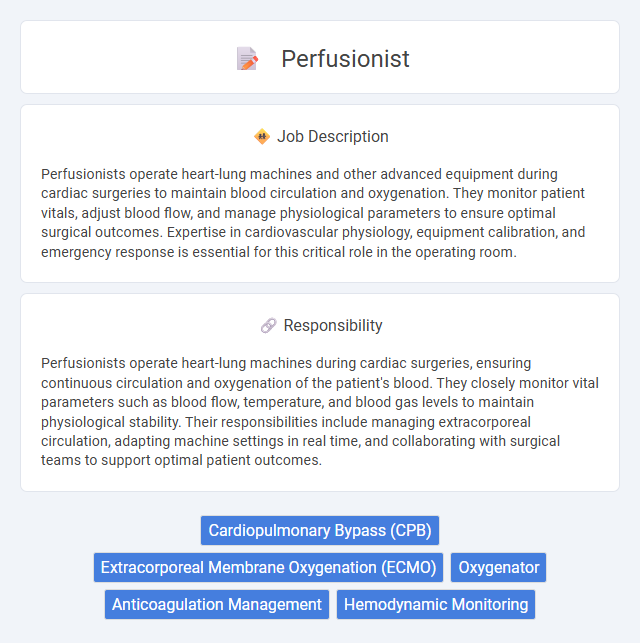
Perfusionists operate heart-lung machines and other advanced equipment during cardiac surgeries to maintain blood circulation and oxygenation. They monitor patient vitals, adjust blood flow, and manage physiological parameters to ensure optimal surgical outcomes. Expertise in cardiovascular physiology, equipment calibration, and emergency response is essential for this critical role in the operating room.
Individuals with strong problem-solving skills, attention to detail, and the ability to stay calm under pressure are likely to be well-suited for a perfusionist role. Those who have a keen interest in physiology, biomedical technology, and teamwork may find this career fulfilling and manageable. People who struggle with high-stress environments or lack patience might face challenges adapting to the demands of this profession.
Qualification
A Perfusionist must possess a bachelor's degree in perfusion technology or a related biomedical field, along with certification from recognized bodies such as the American Board of Cardiovascular Perfusion (ABCP). Clinical training and hands-on experience in operating heart-lung machines during cardiac surgeries are essential for competency. Strong knowledge of cardiovascular physiology, surgical procedures, and patient safety protocols is critical for qualification in this highly specialized medical role.
Responsibility
Perfusionists operate heart-lung machines during cardiac surgeries, ensuring continuous circulation and oxygenation of the patient's blood. They closely monitor vital parameters such as blood flow, temperature, and blood gas levels to maintain physiological stability. Their responsibilities include managing extracorporeal circulation, adapting machine settings in real time, and collaborating with surgical teams to support optimal patient outcomes.
Benefit
Perfusionists probably experience significant benefits such as high job stability and competitive salaries due to the specialized skills they possess in operating heart-lung machines during surgeries. Their expertise is likely in demand, providing opportunities for career advancement and professional growth within healthcare settings. The role may also offer personal fulfillment by directly contributing to critical patient outcomes during complex surgical procedures.
Challenge
A perfusionist's job likely involves managing complex cardiovascular equipment during critical surgeries, presenting high-pressure scenarios that demand precision and quick decision-making. The role probably challenges their ability to continuously monitor and adjust machinery to maintain patient stability, often under time-sensitive conditions. Success in this field seems dependent on adapting swiftly to unexpected changes while ensuring optimal blood flow and oxygenation throughout procedures.
Career Advancement
Perfusionists specialize in operating heart-lung machines during cardiac surgeries, with career advancement opportunities available through certification, advanced degrees, and experience in critical care settings. Pursuing credentials such as Certified Clinical Perfusionist (CCP) or gaining expertise in ECMO (extracorporeal membrane oxygenation) technology enhances professional growth and leadership roles. Opportunities also include supervisory positions, research involvement, and teaching roles within medical institutions or perfusion technology programs.
Key Terms
Cardiopulmonary Bypass (CPB)
Perfusionists operate cardiopulmonary bypass (CPB) machines to maintain circulatory and respiratory function during cardiac surgeries, ensuring oxygenation and blood flow while the heart is stopped. They monitor vital parameters and adjust pump settings to optimize patient safety and support organ perfusion throughout the procedure. Expertise in CPB technology and physiology is essential for managing complex cardiac cases and minimizing complications.
Extracorporeal Membrane Oxygenation (ECMO)
A Perfusionist specialized in Extracorporeal Membrane Oxygenation (ECMO) operates complex life-support technology that oxygenates and circulates blood outside the patient's body during critical care or cardiac surgery. This role demands advanced knowledge of cardiopulmonary physiology, proficiency in ECMO circuit management, and real-time troubleshooting to ensure patient safety and optimize outcomes. Mastery of anticoagulation protocols, hemodynamic monitoring, and interdisciplinary communication is essential for successful ECMO therapy delivery.
Oxygenator
Perfusionists operate the oxygenator, a critical component of the heart-lung machine, to ensure efficient gas exchange during cardiopulmonary bypass procedures. The oxygenator removes carbon dioxide from and adds oxygen to the blood, maintaining patient oxygenation and acid-base balance. Mastery of oxygenator functionality and troubleshooting directly impacts surgical outcomes and patient safety in cardiovascular surgeries.
Anticoagulation Management
Perfusionists play a critical role in anticoagulation management during cardiopulmonary bypass procedures by monitoring and adjusting heparin dosage to maintain optimal activated clotting time (ACT) levels. Their expertise ensures the prevention of thrombosis and bleeding complications, directly impacting patient safety and surgical outcomes. Advanced knowledge of coagulation pharmacology and real-time blood coagulation monitoring technologies are essential for effective anticoagulation management in cardiac surgery.
Hemodynamic Monitoring
Perfusionists play a critical role in managing hemodynamic monitoring during cardiopulmonary bypass procedures, ensuring optimal blood flow and pressure to maintain tissue perfusion. They utilize advanced technologies such as arterial and venous pressure sensors, flow probes, and oxygen saturation monitors to track real-time cardiovascular dynamics. Expertise in interpreting these data allows perfusionists to adjust pump flow rates and vasoactive medications, directly impacting patient outcomes during cardiac surgery.
 kuljobs.com
kuljobs.com